France is hurting towards a financial and political crisis that could bring down Emmanuel Macron‘s presidency, after his prime minister warned the country faces a Liz Truss-style ‘catastrophe’ if his austerity budget is rejected.
Francois Bayrou admitted the odds were ‘at first sight’ stacked against him ahead of a September 8 confidence vote, as opposition parties unite against his plan to slash the deficit by £38billion.
He warned that France was now like ‘a boat that is holed and taking water’ and told voters that rejecting his austerity budget would plunge the country into financial meltdown, driving up borrowing costs and leaving France unable to find lenders for its £2.85trillion debt pile.
France is staring down ‘two catastrophes’, Bayrou warned – soaring interest rates and the risk of markets turning their backs on the country’s major debt.
Citing Liz Truss‘s disastrous six-week premiership, he said: ‘The difficulty that the English encountered two or three years ago and which is when you can’t find lenders.
‘Great Britain is a big country, an important country, and yet in six weeks the government had to leave’.
The parallels with Britain’s disastrous Truss budget – which spooked ministers, sent borrowing costs soaring and forced her out after just 44 days – are now dominating French politics.
Paris insiders say Bayrou is unlikely to survive, but the real danger is that his fall drags Macron down with him.
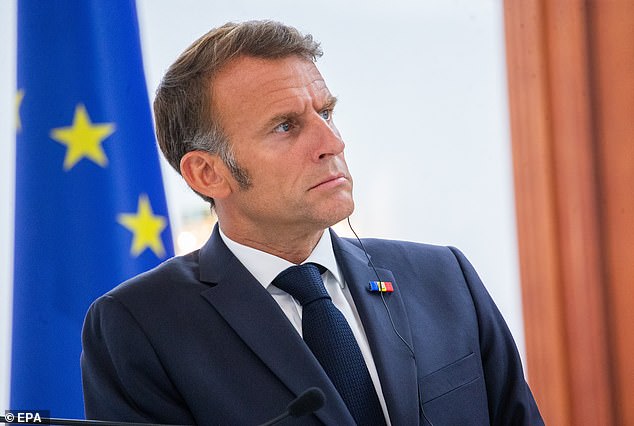
President of France Emmanuel Macron delivers a speech at a press conference during the celebration of Moldova’s Independence Day in Chisinau, Moldova, 27 August 2025
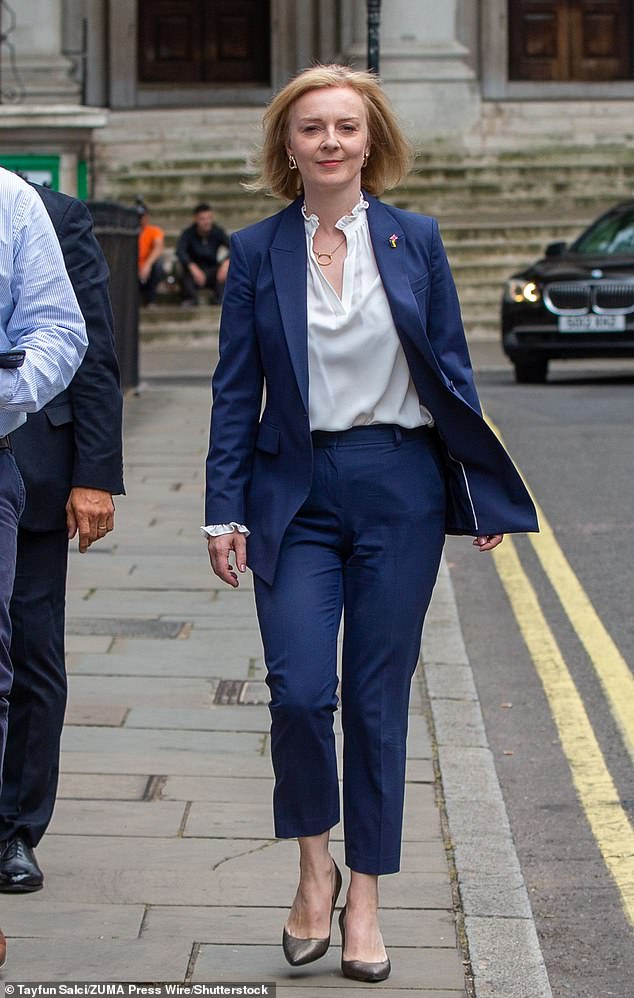
The parallels with Britain’s disastrous Liz Truss budget – which spooked ministers, sent borrowing costs soaring and forced her out after just 44 days – are now dominating French politics
Edouard Philippe, Macron’s former prime minister, said: ‘If nothing happens, if no government can prepare a budget, how do we resolve this question? Through a dissolution [of parliament]. I think it is quite inevitable.’
Jean-François Copé, ex-leader of the centre-right Republicans, went further: ‘Emmanuel Macron should accept that the French people don’t want him any more. The future of the country is at stake.’ Cannes mayor David Lisnard echoed the call.
A bombshell poll by Elabe found 67 per cent of voters want Macron to resign, while an even greater 72 per cent hope Bayrou loses his vote of confidence.
Though the president has ruled out stepping down, his authority looks dangerously weakened.
‘I am prepared to discuss all subjects except one, which is the need to make an effort on the level of debt,’ Bayrou said.
He added that he had been unable to start negotiations with his opponents beforehand because ‘they were all on holiday’, a reference to Macron taking a surfing holiday in southern France just two weeks ago.
But Bayrou admitted the odds were stacked against him, with every opposition party refusing to back his centrist coalition.
Opposition parties from Jean-Luc Melenchon’s radical-Left France Unbowed to Marine Le Pen‘s hard-Right National Rally have vowed to bring Bayrou down.
Even members of Bayrou’s own camp have branded the vote plan reckless with MP Nicole Dubre-Chirat calling it ‘suicidal’.
Few in Paris expect him to survive the month – making him the second Macron prime minister to fall in under a year after his predecessor, Michel Barnier, fell to a motion of no confidence just three months after being appointed.
A Bayrou collapse would leave the president scrambling for options in a hung parliament bitterly divided between the left, the far right and a fragile centrist-conservative alliance.
At the heart of the row is Bayrou’s deeply unpopular budget, which includes abolishing two bank holidays, taxing pensioners, and raising the cost of medicines by up to £43 a year.
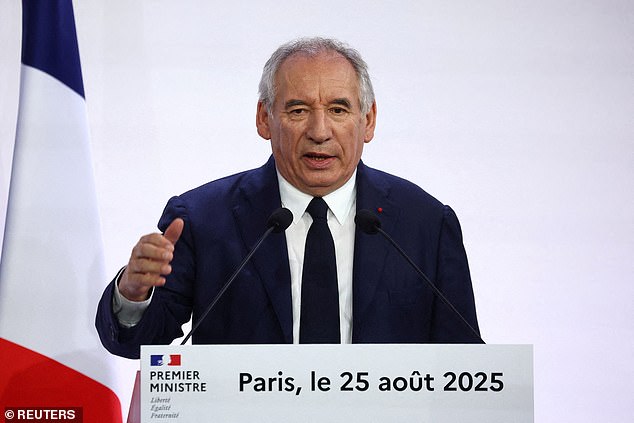
Francois Bayrou admitted the odds were ‘at first sight’ stacked against him ahead of a September 8 confidence vote, as opposition parties unite against his plan to slash the deficit by £38billion

Bayrou said that he had been unable to start negotiations with his opponents beforehand because ‘they were all on holiday’, a reference to Macron taking a surfing holiday in southern France just two weeks ago
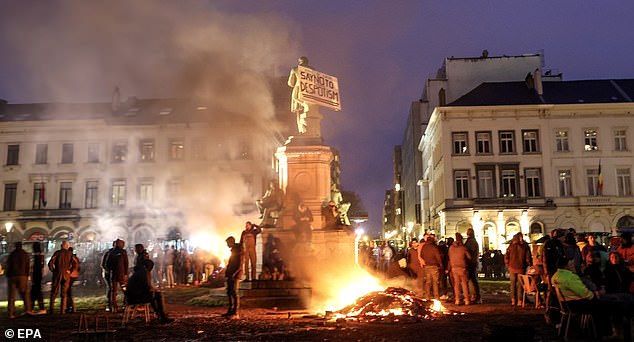
Farmers set a fire as they gather in front of the European Parliament during a protest on the sidelines of a EU summit in Brussels, Belgium, 01 February 2024
He has said all measures are negotiable – except for his headline demand to cut the deficit by £38billion next year.
Business leaders have already sounded the alarm, warning of collapsing confidence, delayed investment and a consumer squeeze as households save rather than spend.
If the Bayrou government falls, it will be down to Macron to make the next move.
One name tipped to replace Bayrou is Defence Minister Sébastien Lecornu, a loyal Macron ally and skilled operator who could appeal to conservatives and even talk to the far right.
Macron could also look to the centre-left, with former Socialist PM Bernard Cazeneuve floated as a possible compromise – but that would mean swallowing demands for higher taxes and reopening pension reforms.
The president could also gamble on another snap election to break the deadlock.
But this is precisely how France ended up in this chaos last summer – and polls suggest a fresh vote would likely deliver another hung parliament.
Worse, it could hand a shock majority to Marine Le Pen’s National Rally, whose leader declared on X that ‘only a snap election will allow the French to choose their own destiny.’
Critics from across the spectrum are now urging Macron to stand down altogether.
Far-left firebrand Jean-Luc Mélenchon has even threatened a parliamentary motion to remove him, while former allies openly question whether he can carry on until 2027.
With debt soaring, protests looming under the banner of ‘let’s block everything’, and a confidence vote likely to topple Bayrou, investors are growing increasingly jittery.
The movement, born in far-Right conspiracy circles but quickly adopted by unions and the Left, has gone viral. Telegram groups are buzzing with plans for ‘citizens’ resistance networks’ and nationwide disruption.
And ordinary voters are behind it – a Harris Interactive poll for the RTL radio network this week found 63 per cent of the public support the movement.
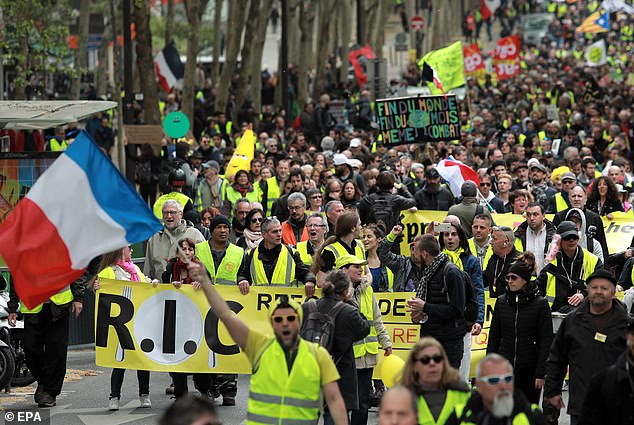
Protesters from the ‘Gilets Jaunes’ (Yellow Vests) movement march through Paris’ streets on 27 April 2019
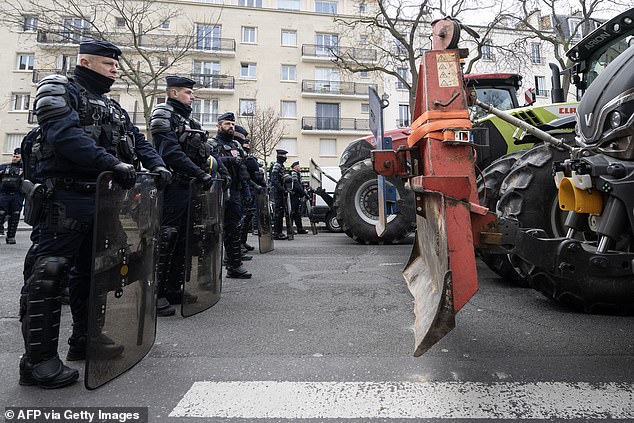
French Republican Security Corps police officers (L) stand next to tractors during a demonstration of French farmers of the Coordination Rural agricultural union, ahead of the opening of the 60th International Agriculture Fair on the Avenue de Versailles, western Paris, on February 23, 2024
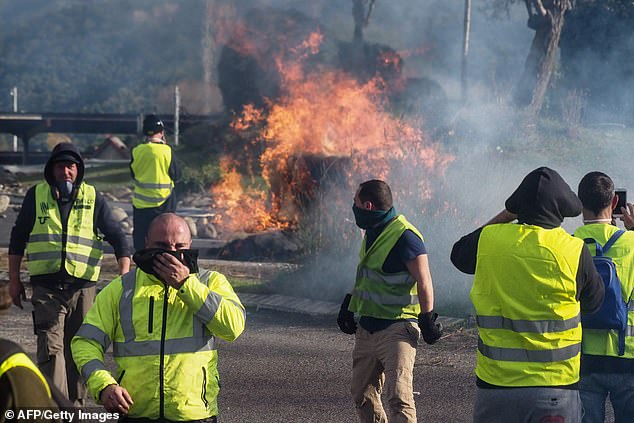
Protestors wearing a yellow vest (gilet jaune) stand next to a burning barricade as they demonstrate against rising costs of living they blame on high taxes at the A9 highway toll of Le Boulou, southern France on December 22, 2018
At a fiery activist meeting in Orléans, one speaker declared: ‘We have not managed to drive back the bosses, the bourgeoisie and its political class because we haven’t blocked the country.’
Another went further: ‘They have to feel the cannonballs. They have to be scared.’
Observers warn that, just as in Britain in 2022, rising borrowing costs and political deadlock could spiral into a market rout. For Macron, unable to stand again in 2027 but determined to cling on, the threat is existential.
It comes seven years after violent rioting known as the ‘Yellow Vest’ movement broke out across France after Macron offered economic concessions to his countrymen which were expected to cost the country £9billion following a planned fuel tax hike.
In 2018 the president had taken to the national airwaves to address the spiralling crisis for the first time in December. He announced an increase in the minimum wage, tax cuts for retirees and other concessions aimed at calming the streets.
But a leader of the Yellow Vest movement said that Macron’s peace offering was not enough.
The crisis began as protests against a planned fuel tax hike – which Macron abandoned – but quickly mushroomed into a broad and visceral demonstration of anti-government resentment aimed squarely at the president, who was seen by many as being out of touch with the working French.
And only last year, French farmers choked off major motorways around Paris and threatened to blockade the capital during an intensifying standoff with the government over working conditions, incomes, red tape and environmental policies.
If Bayrou falls and the markets turn, France’s self-styled reformer president may find his second term cut short in humiliation – a European echo of Liz Truss’s downfall.












